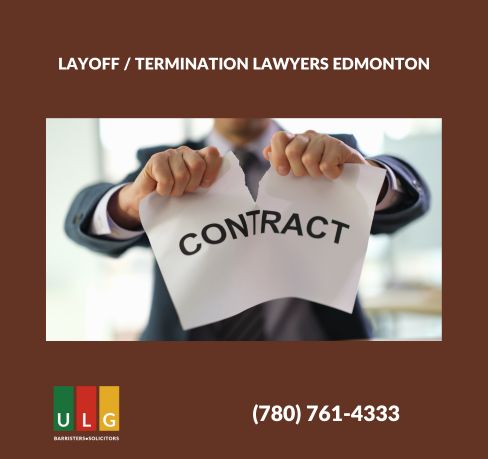In Edmonton, Alberta, the distinction between a layoff and an employment termination can be critical for both employers and employees. Understanding when a temporary layoff transitions into a full-blown employment termination is vital because the legal and financial implications can be significant. This article will explore the nuances of employment termination, the laws governing layoffs and terminations in Edmonton, and how the Ulasi Law Group can assist individuals navigating these complex situations.
Understanding Layoffs vs. Employment Termination in Alberta
In Alberta, employment relationships are generally governed by the Employment Standards Code (ESC) and, to a lesser extent, common law principles. Under the ESC, an employer can temporarily lay off an employee without terminating their employment, provided they follow specific guidelines. The intent of a layoff is typically to suspend employment rather than end it, often due to economic downturns, operational restructuring, or seasonal business demands. However, a layoff can legally become a termination if certain conditions are met.
What Is a Temporary Layoff?
A temporary layoff is defined by the ESC as a period during which an employee is off work, but the employment relationship is maintained. During this period, the employer can recall the employee to work. According to Alberta law, a layoff is considered temporary if it does not exceed 90 days within a 120-day period. If the employer recalls the employee within this timeframe, it remains a layoff rather than a termination.
Key Conditions of a Temporary Layoff:
- Advance Notice: Employers are generally required to give written notice of a layoff to employees, outlining that it is temporary.
- Layoff Period: A layoff should not exceed 90 days within a 120-day period. If the layoff goes beyond this, it becomes an employment termination.
- Continuation of Benefits: Employers may be required to continue certain benefits, such as health and dental insurance, depending on the employment contract and the organization’s policies.
When Does a Layoff Become an Employment Termination?
A layoff automatically turns into an employment termination if:
- The 90-day period expires without the employer recalling the employee.
- The employer informs the employee that the layoff is permanent.
- The employment contract or workplace policies specify a shorter layoff period that was exceeded.
When a layoff transitions to a termination, the employer must provide termination pay, which generally includes compensation in lieu of notice as required by law. Under the ESC, the amount of notice or pay in lieu of notice depends on the employee’s length of service, as follows:
- Less than 3 months: No notice required.
- 3 months to 2 years: At least 1 week’s notice.
- 2 to 4 years: At least 2 weeks’ notice.
- 4 to 6 years: At least 4 weeks’ notice.
- 6 to 8 years: At least 5 weeks’ notice.
- 8 to 10 years: At least 6 weeks’ notice.
- 10+ years: At least 8 weeks’ notice.
Implications of Layoff Becoming Termination
When a temporary layoff turns into a termination, employees become entitled to severance or termination pay. This pay is meant to ease the transition between jobs and compensate the employee for the sudden loss of income. Employees also become eligible for unemployment benefits and may receive additional compensation based on the terms of their employment contract.
Just Cause Termination and Wrongful Dismissal
Employment termination can also occur due to just cause, which is when an employer ends the employment relationship due to misconduct or breach of duty by the employee. In such cases, the employer is not required to provide notice or severance pay. However, just cause is challenging to prove and must meet a high legal threshold.
If an employer terminates an employee without just cause and fails to provide adequate notice or pay in lieu of notice, this is known as wrongful dismissal. In these cases, employees can pursue legal action to recover compensation, including damages for the sudden termination and lost wages.
Legal Recourse in Wrongful Dismissal Cases
Employees in Edmonton who believe they have been wrongfully dismissed can file a claim under Alberta’s Employment Standards Code or pursue a lawsuit in civil court. Both avenues require a clear understanding of the legal grounds for the claim, and employees are advised to seek legal assistance to navigate the complexities of employment law.
The Role of Ulasi Law Group in Employment Termination Cases
Employment law in Alberta can be complex, especially when determining the fine line between layoffs and terminations or addressing wrongful dismissal claims. Ulasi Law Group, a well-established firm in Edmonton, specializes in employment law and is equipped to provide comprehensive support to individuals and employers dealing with employment termination cases. Here’s how the Ulasi Law Group can assist:
1. Providing Clarity on Layoff and Termination Rules
The Ulasi Law Group understands that the rules surrounding layoffs and termination can be confusing for both employers and employees. They offer consultations to help clients understand their rights and obligations under Alberta’s employment standards. For employees, this involves an assessment of the layoff conditions to determine if their situation has transitioned into a termination.
2. Negotiating Severance Packages
If a layoff turns into a termination, Ulasi Law Group assists employees in negotiating fair severance packages. Severance agreements can vary depending on the length of service, position, and specific terms in the employment contract. Ulasi Law Group’s lawyers work to ensure that employees receive the compensation they are entitled to under Alberta law, often securing additional benefits such as extended healthcare or outplacement services.
3. Pursuing Wrongful Dismissal Claims
If an employee feels their termination was unjust or handled inappropriately, Ulasi Law Group can file a wrongful dismissal claim on their behalf. They work closely with clients to gather evidence and prepare a case that demonstrates that the termination was without just cause or did not meet the requirements for termination pay. With expertise in civil litigation, the firm represents clients in negotiations and court proceedings, seeking maximum compensation for their clients.
4. Advising on Employment Contracts and Employer Obligations
For employees currently navigating layoffs or uncertain employment conditions, the Ulasi Law Group provides a proactive approach to employment contracts and benefits. Their lawyers assist clients in understanding the terms of their employment agreements and any clauses that may impact their entitlements during layoffs or terminations. This support is invaluable in ensuring employees are not taken advantage of during difficult employment transitions.
5. Representing Employers in Compliance and Dispute Resolution
Ulasi Law Group also represents employers who may face disputes over layoffs and terminations. They assist in ensuring that employers comply with Alberta’s Employment Standards Code and minimize potential liabilities. In cases where an employee claims wrongful dismissal, Ulasi Law Group offers defense services and alternative dispute resolution methods to help employers achieve fair and lawful outcomes.
Final thoughts
Navigating the complexities of employment termination in Edmonton requires a thorough understanding of the legal distinctions between layoffs and terminations. While a temporary layoff may seem straightforward, it can quickly turn into a termination if specific conditions are not met, entitling employees to additional compensation and benefits. Furthermore, when an employee is terminated without just cause or adequate notice, they have grounds to pursue a wrongful dismissal claim.
Ulasi Law Group is uniquely equipped to assist both employees and employers in these situations. Their expertise in employment law allows them to provide clarity, negotiate fair severance, pursue wrongful dismissal claims, and ensure compliance with Alberta’s employment standards. For individuals and businesses in Edmonton dealing with employment termination issues, partnering with Ulasi Law Group can make a significant difference in navigating and resolving these challenging situations successfully.

